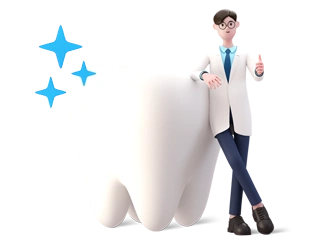
If you are familiar with TMJ pain, you know how badly you struggle with your meals. Imagine the frustration of waking up with aching jaws and a constant tension in your jaw muscles. The discomfort arises from temporomandibular joint disorder, a condition affecting the joints on both sides of the head connecting to the jaw.
Now, you might be wondering whether a general dentist can treat TMJ dysfunction syndrome. The answer is yes, and we have explained the common treatment procedures recommended by dentists to address this pain.
WHAT IS TMJ DYSFUNCTION SYNDROME?
TMJ disease is a condition affecting the ligaments and muscles around the joints of your jaw. These conditions can complicate and lead to several health issues like headaches, jaw pain, and difficulty in eating. It affects around 5% to 12% of adults, which calls for professional care from dentists. Particularly, those aged between 20 and 40 experience TMJ pain.
HOW DO DENTISTS DIAGNOSE TMJ PAIN?
At the outset, your dentist will examine your jaw after listening to your symptoms. When you make movements with your mouth, the doctor might feel the jaw and examine the range of motion. To identify the areas of discomfort, dentists usually press the areas around your jaw.
On suspecting temporomandibular joint disorder, they usually recommend the following tests:
- Dental X rays
- CT scan of the jaw bones
- MRI scan to detect issues with the disk of the joint or soft tissues
COMMON MEDICATION FOR TMJ PAIN
Treatment options generally start with medicines. Here are some commonly recommended medications to treat TMJ pain.
- Strong pain relievers and anti-inflammatories
- Tricyclic antidepressants for pain relief and help in sleep
- Muscle relaxants to treat muscle spasms created by TMJ disease
THERAPIES TO TREAT TEMPOROMANDIBULAR JOINT DISORDER
Dentists generally recommend the following therapies to treat TMJ dysfunction syndrome once it is diagnosed.
- Occlusal appliances: Occlusal appliances involve treating the mouth glands or oral splints. These appliances relieve jaw pain, as you insert the device over your teeth. Dentists also recommend nightguards, special dental appliances also prevent you from grinding or clenching your teeth while sleeping.
- Physical therapy: Physical therapies like ultrasound might help in relieving jaw pain, along with moist heat and ice. The purpose of these exercises is to stretch your mouth and strengthen the jaw area. The pain tends to subside once the jaw becomes stronger.
- Relaxing techniques: Dentists also help patients with certain relaxation techniques. On relaxing the jaw bone area, it experiences less stress. This, in turn, reduces the pain you have been experiencing.
SURGICAL PROCEDURES TO TREAT TMJ PAIN
Dentists resort to surgical procedures to treat temporomandibular joint disorder when other options fail. Have a look at some of the common surgical procedures to treat such conditions.
ARTHROCENTESIS
This procedure involves minimal invasion, where doctors insert small needles into the affected joints. They remove inflammatory remnants and debris from the affected area using this method.
INJECTIONS
Corticosteroid injections in the affected jaw joint prove helpful for some patients. Doctors inject botulinum toxin type A into the muscles of the jaw to facilitate chewing and relieve TMJ pain.
TMJ ARTHROSCOPY
Arthroscopic surgery is another common surgical method used to treat TMJ pain. Dentists insert a thin tube in the joint space. They use small surgical instruments after inserting an arthroscope to carry out the surgery. Compared to open-joint surgeries, this process involves fewer risks.
MODIFIED CONDYLOTOMY
This is an effective process to treat TMJ, carrying out surgery on the mandible and not the joint. It helps in relieving locked jaws and alleviates the pain.
OPEN-JOINT SURGERY
Dentists, along with other surgeons carry out open-joint surgeries when all other treatment procedures fail. They repair the affected joint in the jaw through an open-joint surgery. This procedure involves greater risks compared to the treatments explained above.
YOUR DENTAL CLINIC CAN HELP YOU
Centre Dentaire Olympique continues to be the first choice for patients in the West Island to relieve TMJ pain. With our less-intrusive methods, professional dentists treat the pain in your jaw bone effectively. Over the years, we have set benchmarks in the dental care industry, and our impressive track record speaks of our success. Reach out to us and let our dentists treat your TMJ disease.



